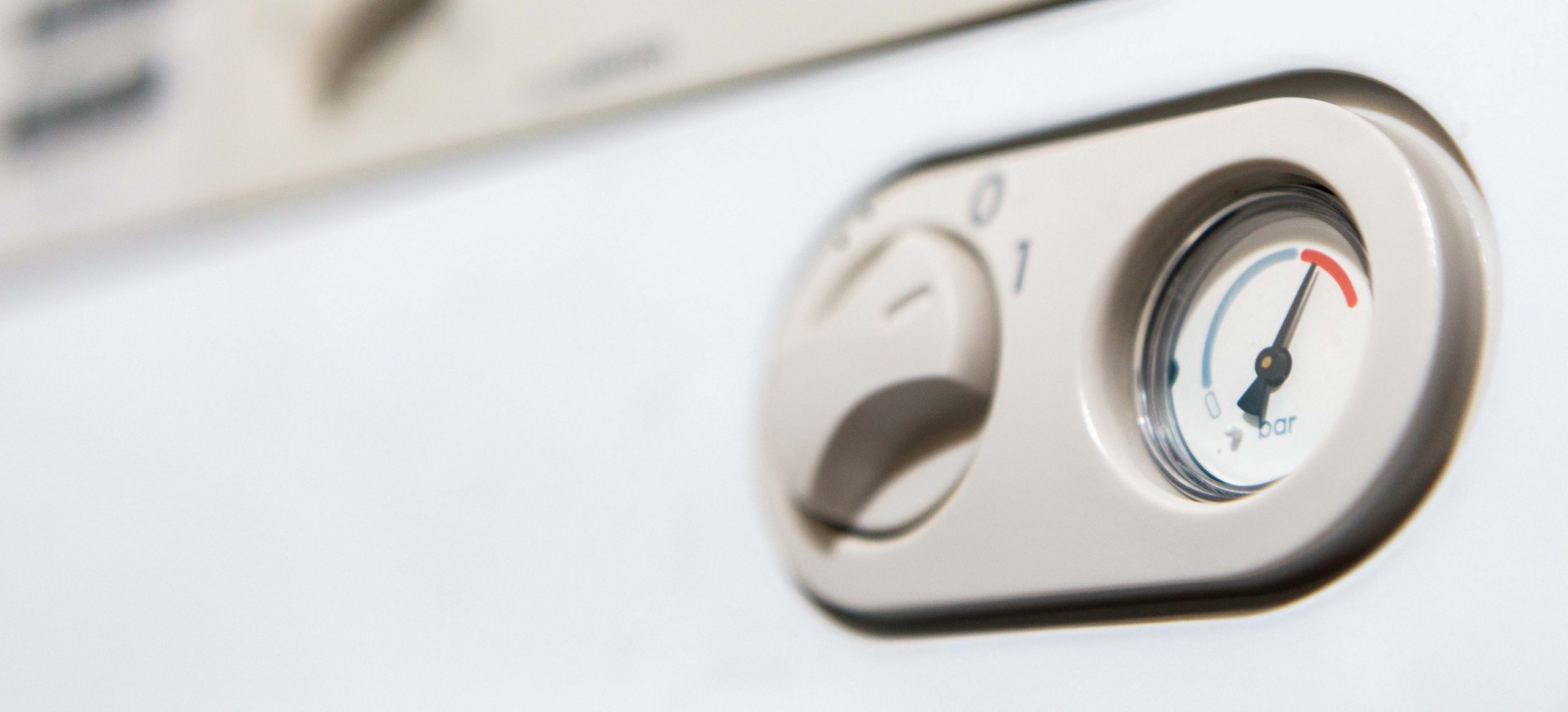Boiler Pressure Too High – Find Out Why and How to Reduce it

Noticed your boiler’s pressure gauge creeping up, or flashing a worrying error code on the digital display? It could be a sign that your boiler pressure is too high, and while it might seem alarming at first, it’s a fairly common issue in UK households.
Boiler pressure refers to the balance of water and air running through your central heating system. Every modern boiler – whether it’s a combi, system, or conventional model – comes with a pressure gauge (usually found underneath the panel) that shows exactly what’s going on inside. If that needle’s climbing too high or the display is throwing out fault codes, it’s a clear sign your system needs some attention.
In this post, we’ll walk you through:
Let’s get started and help you take control of your heating system before it causes more trouble than it’s worth.
What Pressure Should My Boiler Be?
What should your boiler pressure be when the heating is on? Most, if not all, pressure gauges have coloured markers for the safe and unsafe conditions of the pressure inside your appliance. Ideally, when the boiler is on, the pressure should be between 1,5 to 2 bars, and when it’s not working, 1 to 1.5 bars. Usually, safe levels of pressure are marked in green, and too low or too high pressure is marked in red.
We consider high boiler pressure when the arrow points in the red zone, exceeding 2 bars. In fact, that’s not dangerous but can lead to costly damage to your heating system, and if it’s high enough, it can reduce the boiler’s efficiency. Unless your boiler has a faulty pressure gauge or lacks one at all, looking at it is enough to know that your appliance is in trouble.
Anything above 2.5 bar is considered too high. Pressures beyond 2.75 bar definitely require letting off steam, usually by bleeding a radiator.
Why is the Boiler Pressure Too High?
If you’ve noticed your boiler pressure gauge climbing above 2 bars, it’s usually a sign that something’s not quite right. While it’s not necessarily a crisis, consistently high pressure isn’t how your heating system is meant to run, and it’s often a clue that there’s an underlying issue that needs a bit of attention.
Recently re-pressurised the boiler?
One of the most common reasons for high boiler pressure is simple human error – topping up the pressure a little too much after bleeding radiators or doing some routine maintenance. If you’ve recently used the filling loop, it’s easy to misjudge how much water the system actually needs. Just a little too much can cause the pressure to drift above safe levels. It happens far more often than you might imagine, and thankfully, it’s generally a simple fix.
Too much water in the system
Another likely reason is that there’s too much water inside the boiler. This might be because it was accidentally overfilled, or it could be down to a fault, like a stuck filling loop valve or a dodgy pressure sensor, that keeps letting water into the system even when it’s not needed. When that happens, the balance inside your boiler is thrown off, and pressure can rise above where it should be. If the pressure stays high for too long, it can lead to leaks or make your boiler work harder than necessary, affecting overall efficiency.
Faulty or ageing parts
Sometimes, it’s not user error at all – just wear and tear. Even newer boilers can develop faults. A damaged expansion vessel, a clogged pressure relief valve, or even a misreading pressure gauge can all cause your boiler to either appear over-pressurised or actually be operating under too much strain.
And if your unit is getting on a bit – say, 10 years old or more – a boiler losing pressure or going too high can be a problem caused by the age of your appliance.. Older units frequently struggle to maintain consistent pressure, and internal components naturally wear out over time. If you find yourself constantly tracking or changing the pressure, or seeing any unusual behaviour, it may be time to schedule a service or consider an upgrade.
Is High Boiler Pressure Dangerous?
What’s the worst that could happen if the boiler pressure is too high? In most cases, high boiler pressure isn’t immediately dangerous, but it can lead to problems if left unresolved. Your unit can start leaking, or some internal elements can get damaged, so it’s not a minor problem or one you should overlook. If pressure problems arise, call a professional for your boiler repairs in London.
While high boiler pressure may not necessarily be dangerous, precautions should still be taken to avoid potential issues. In most cases, boilers are designed to automatically shut down when pressure exceeds a certain level, thanks to a safety mechanism called a Pressure Release Valve (PRV). This PRV is crucial in preventing pressure from reaching hazardous levels. However, relying solely on the PRV for pressure control is not advisable. It may lead to inefficiencies in the system and, in some cases, pose risks if the relief valve is faulty or jammed.
If you spot water dripping from the pressure relief valve or see puddles beneath the boiler, it could be a sign that the system is over-pressurised and has activated a safety mechanism to release the excess pressure. Your unit can start leaking, or some internal elements can get damaged, so it’s not a minor problem or one you should overlook. Whistling, banging, or gurgling sounds may also occur if there’s too much pressure circulating through the system.
The worst-case scenario for boilers experiencing prolonged high pressure could result in a shutdown or breakdown, potentially causing damage to the boiler itself and leading to water leakage, impacting the surrounding area, such as a soaked carpet. Regular monitoring, maintenance, and addressing high-pressure situations promptly are essential for the safe and efficient operation of boilers.
How to Reduce Boiler Pressure
Reducing boiler pressure is crucial for keeping your appliance safe and sound, returning it back to its normal performance and effectiveness. Keep in mind that both high and low-pressure readings mean no good for your heating system’s performance. Reduce the pressure too much, and you will have to repressurise your boiler.
And here are the things that can reduce boiler pressure:
Drain the overfilled central heating system
One of the simplest things you can do to reduce the pressure is to drain the excess water from the central heating system. Look for the drain cock on the system and let some water out. Prepare a bucket to collect the water and a mop, in case of accidental spills.
While draining the water, keep your eye on the boiler’s pressure gauge to track any changes that may occur.
Bleed radiators to release airlocks
Does bleeding radiators affect boiler pressure? Yes, if the problem is the air and water ratio inside of the system. If the problem causing the pressure to rise is something else, then bleeding won’t achieve anything.
Bleeding a radiator helps release the air out of the system and bring the water’s flow back on track. The release valve is usually on the top right side of the radiator, and you need to turn it with a bleed key to let the air out.
You can do this yourself, but keep in mind that sometimes this is a messy job, and you will need a bucket and some towels to collect the water that comes out.
Tools you need: radiator bleed key, a cloth or a bucket.
What to do: Turn the release valve so the air and excess water can get out of the system.
Costs: Some DIY enthusiasm and around 15 minutes of your time, based on how many radiators you need to bleed.
Troubleshoot boiler issues, if any
Sometimes, when the pressure is too high, the boiler might leak at the same time. In such cases, it’s important to troubleshoot the issue and determine what is the cause and what is the effect. For example, high boiler pressure can cause leaks, and an overfilled leaking appliance can cause high pressure.
As soon as you spot the increased pressure and leaking water, be sure to:
- Turn off the water supply.
- Turn off the heating.
- Clean up all the mess.
- Have the boiler inspected by a gas-safe engineer.
Tighten up or replace defective valves
Sometimes, one of the reasons behind high boiler pressure is a faulty valve. A defective valve may cause the water to spill into the heating circuit, which, in turn, causes the pressure inside the system to rise. If the valve is loose, try tightening it, and if that doesn’t help, then you will need to replace it. Only a gas-safe engineer should do the latter.
Boiler Pressure Keeps Rising? Here’s When You Should Call a Boiler Engineer
Is your boiler pressure still high even after bleeding radiators? Well, you might be dealing with a serious issue, so better to find a boiler engineer to inspect it. Additionally, if several of the fixes have been applied and the boiler pressure keeps rising, that is a clear sign that a new boiler may be needed.
For your convenience, check the control panel of the boiler for error codes. In the table below, you’ll see the code variations based on the boiler brand.
Please note that your boiler engineer would be much happier if you told them what error code you’re seeing on the control panel. This will help them provide you with a correct quote for the job, and will also give the specialist an idea about what the problem is. Thus, they will prepare for the job in advance and save both of you time.
| Brand-related boiler pressure problems | Error codes |
| Worcester Bosch boiler pressure too high | A1, E9, 224 |
| Vaillant boiler pressure too high | F.12, S.41, F.74, F.75 |
| Ideal boiler pressure too high | Water pressure, F1, most problems are described without codes |
| Ferroli boiler pressure too high | A37, A03 |
| Baxi boiler pressure too high | 117, 162, 166, E164, H.02 – .06, E117 |
| Glow Worm boiler pressure too high | F32, F73 / F74, boiler locks out within 10 seconds, F9, F09, F.74 |
| Vokera boiler pressure too high | AL40, AL41, E040, E041, or system message |
| Potterton boiler pressure too high | E117 |
How to Prevent Boiler Pressure From Going Up
Once the problem is fixed, whether you’ve determined the reason for the increased pressure or not, there are some things you can do to prevent it from happening.
- Be careful not to overfill the system.
- Bleed the radiators regularly. This will let the air out and decrease the pressure inside your system.
- Schedule a regular boiler service and maintenance with a reliable company.
- Close the filling loop – two valves that let the water inside the system. Keeping them open for long will let more water inside your system and cause pressure to rise again.
- Get your expansion vessel checked, as this is the part of the system that keeps the pressure consistent and prevents sudden changes.
When it comes to fixing a problematic central heating system, replacing parts or repressurising the boiler, please always call a Gas Safe Registered engineer. These are not DIY tasks, and you can do more harm than good if you attempt DIY fixes.
Takeaways
To sum up the guide, here are the main takeaways to remember:
- High boiler pressure isn’t dangerous, and your boiler won’t blow up.
- Low boiler pressure is not good for your heating system either.
- There are many reasons that can cause the pressure to increase.
- You must discuss the error codes with the engineer ahead of time.
- Aside from bleeding radiators, all other fixes must be performed by a specialist.
Boiler Pressure Too High – Find Out Why and How to Reduce it
Need help? Hire the London Property Service experts today by giving us a call on 020 3078 5920.




